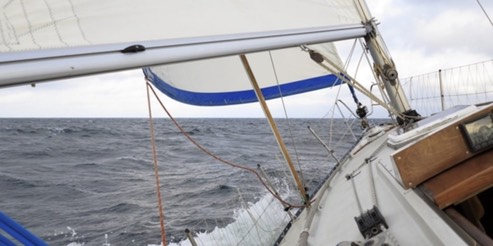5 Things in Sailing I’ve Learned the Hard Way

With summer in full bloom, I sit here on a mooring thinking… What are some things I’ve learned the hard way on this boat? There are more than this but this is what I came up with today. Feel free to share your own if you’re not too proud.
5. Everyone has a different opinion in this world of sailing.
When
I got my first cruising boat, a Catalina 30, I quickly realized this
thing was full of systems I knew nothing about. The motor wasn’t running
and what I knew about fixing diesel engines could fit on the back of a
business card; and there were many other areas that I needed to address.
That’s ok; I can call a professional! The next thing that became clear
was that no two people in this world seem to agree on anything. There
were so many tradesmen who were self taught or had learned from an
informal “passed-knowledge” kind of a way, that consensus was hard to
find. I got through it by leaning on and following the recommendations
of fellow-sailors who seemed experienced, reasonable and logical. It’s
something that makes ASA so important. I know it sounds like shameless
promotion, but this idea of an agreed upon way to do things and a
measurement/certificate of success just makes sense. Are these methods
beyond reproach? Not at all, but a recorded system built on an accord of
what’s right is inevitably and obviously better than one giant
telephone game.
4. If you don’t put the drain plugs in, the boat sinks!
When sailing dinghies, you must remove the drain plugs when you pull
the boat out of the water to suck out all that splash water from the
bilge. If you’re like me, you throw the plug(s) into a spot on the boat
that will instantly become invisible. And if you’re really like me,
you’ll forget to put the drain plug back in when you next launch the
boat. If you’re really, really like me, you won’t notice the boat is
filling with water and you’ll drive your truck away and park it. When
you return, the boat will be, oh, about half full. It’s this moment
where you have to make a quick decision. Your first option is to stare
in shock as your pretty boat looks at you wondering what in God’s name
you have done. A better option is to sprint to your truck and see if you
can salvage this very embarrassing situation. I’ve done it twice, and
twice I’ve been able to get that heavy thing enough on the trailer to
pull it up and drain out the water and, then, uh, put the drain plugs
in…Oh, one piece of advice if you happen to do this yourself. Don’t look
up. Yes, people are looking and yes they want you to look. Don’t do it.
3. Reef isn’t just the name of the restaurant down the street.
At some point most sailors ask themselves: “Do I know how to reef this
thing?” From there, there are two kinds of sailors. Ones that read and
test and figure it all out for, when the time comes, they are ready to
adjust. And then there are the ones that watch the white caps build and
look at that very distant shore and think, “is the red line the reef?”
It is of course because it’s the only one you’ve never used. This next
course of events will either go horribly wrong where this new red line
doesn’t make any sense and this boat is really heeled over. You hear
pots falling on the cabin floor but you’re pretty sure you don’t have
any pots on board. The other possibility is that everything works and
you have a lovely epiphany – reefing isn’t that hard and now 18-knots is
not terrifying… it’s actually fun!
2. The plan HAS to be flexible.
Sometimes, maybe most
times, when you plan an extended sailing trip, you set departure,
arrival and return dates and times based on what’s happening in life.
Maybe it’s something to do with the kids, or work, or some other pending
commitment. We get it, but it’s important to understand that remaining
flexible when it comes to sailing is something that has to be part of
the equation. This activity revolves around an uncaring and, at times,
selfish woman. She doesn’t care about your Monday presentation. She
never did and she’s more than happy to let you know how much she doesn’t
care. So many negative experiences have been had trying to return to
adhere to a schedule. The flip side is true too. I remember setting out
with my semi-sailing girlfriend (and dog) to spend some time on an
island 30-miles away. It was a seaworthy open 21-foot catamaran that
could handle ocean conditions but five miles in it was getting sketchy. I
put in a reef and settled in but the girl and dog were getting
drenched, the boat was bouncing all over the place and a voice in my
head said, “Turn back man.” It probably would have been a story to
tell, but I’m not sure hers and mine would have been the same.
1. People need direction even if it means telling them to do nothing. I’m a laid back skipper. I don’t like to make people feel they are in my classroom or worse, working a day job for me. I usually let them help if they want to or relax and enjoy, if that’s what they’re after. However, I once learned a lesson while docking my boat that made me not want to be too laid back.
I was pulling into a two-boat-length-long, end-tie slip with my neighbor’s docked boat in front of us. I didn’t say much to my non-boating buddy who was at the ready. I had pulled the boat in single-handed tons of times so I didn’t feel the need to say much. What I didn’t understand was that he thought he needed to help. I didn’t tell him he did not need to help. Upon reflection, it’s only natural that he would think what he thought – it’s one of those things that seems like you should pitch in and lend a hand. So, as I started to saddle up to the dock, he jumped off the boat onto the dock with bowline in hand as I was still at the helm. Uh oh. “Just grab a stanchion,” I said calmly, but knowing immediately he wouldn’t know what a stanchion was. At that moment he yanked in the line, and the bow of the 32-foot cruiser came in and the stern went out. I felt like someone was pushing me on a rope swing. I told him to let go, hit reverse and took another pass. It all worked out fine but it made me realize even telling someone to do nothing is sometimes important.
